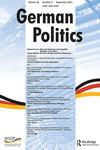Civil Society, Cleavage Structures, and Democracy in Germany
IF 2.1
3区 社会学
Q2 POLITICAL SCIENCE
引用次数: 5
Abstract
ABSTRACT This article analyses the consequences of recent changes in cleavage structures in German society for civil society, democracy, and social cohesion. It argues that the emergence of a new ‘demarcation-integration’ cleavage has politicised civil society in Germany in several ways. As a result, the role of civil society for the future development of German democracy has become highly ambivalent. The article is organised into four parts. First, recent transformations in political conflict structures in Western European countries are outlined. Second, the article presents data on the manifestation of this conflict in Germany after the so-called ‘refugee crisis.’ Third, the consequences of these new conflicts on civil society are analysed. Fourth, the relationship between civil society and democracy is discussed. The article concludes with suggestions for future research.德国的公民社会、分裂结构与民主
本文分析了最近德国社会分裂结构变化对公民社会、民主和社会凝聚力的影响。它认为,新的“划分-整合”分裂的出现在几个方面使德国的公民社会政治化。因此,公民社会对德国民主未来发展的作用变得非常矛盾。文章共分为四个部分。首先,概述了西欧国家最近政治冲突结构的变化。其次,文章提供了在所谓的“难民危机”之后,这种冲突在德国表现的数据。第三,分析了这些新冲突对公民社会的影响。第四,讨论公民社会与民主的关系。文章最后对今后的研究提出了建议。
本文章由计算机程序翻译,如有差异,请以英文原文为准。
求助全文
约1分钟内获得全文
求助全文

 求助内容:
求助内容: 应助结果提醒方式:
应助结果提醒方式:


